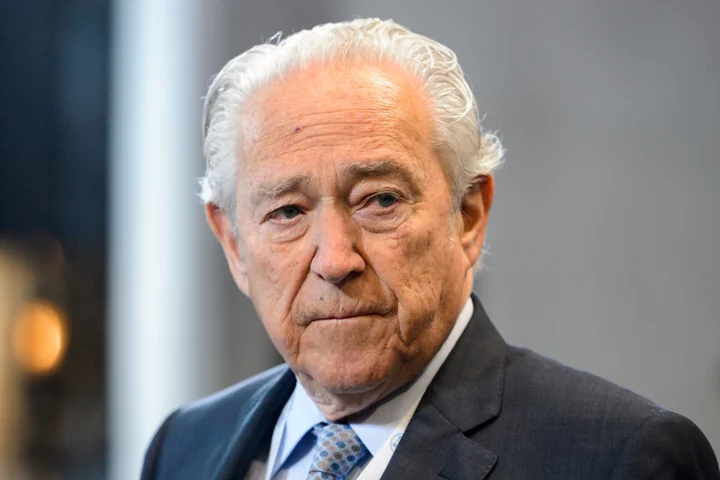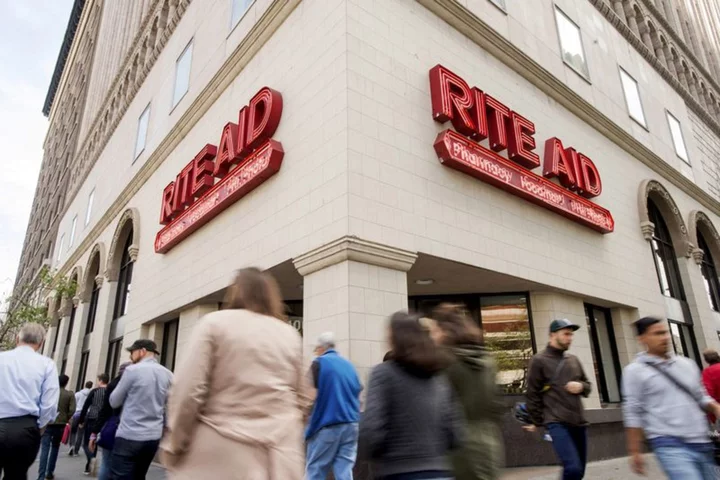Rainer Gut, who engineered the mergers and acquisitions that transformed Switzerland’s Credit Suisse Group AG into a goliath global investment bank, one that proved difficult for subsequent generations of executives to manage, has died. He was 91.
He died on Oct. 11, the Neue Zürcher Zeitung newspaper reported. It didn’t give details.
The Swiss-born Gut, whose career included stints on Wall Street, held top positions at Credit Suisse for 23 years, from 1971 to 2000. His ambition, as he put it, was to expand the Zurich-based bank beyond its roots in private wealth management to become “a major player in every area of financing activity around the globe.”
Under his leadership, nearly 20 firms joined the Credit Suisse empire. The bank bought or took control of entities including First Boston Corp. in 1988; Switzerland’s Bank Leu in 1990 and Volksbank in 1993; Switzerland’s second-biggest insurer, Winterthur Insurance Group, in 1997; the money-management unit of New York investment bank Warburg Pincus in 1999; and the Wall Street firm Donaldson, Lufkin & Jenrette in 2000.
In 1998, Credit Suisse’s assets surpassed those of Swiss Bank Corp. and Union Bank of Switzerland, fulfilling Gut’s goal of making his institution No. 1 among the “big three” Swiss banks. Soon after, Swiss Bank and Union Bank merged to create today what today is UBS AG.
As Credit Suisse’s honorary chairman – the largely ceremonial position he was awarded when he stepped down in 2000 – Gut had a front-row seat as the global bank he built endured two decades of embarrassing revelations, management turnover and attempts at restructuring. His successors atop the firm aimed to shrink its size, retreat from Wall Street and narrow its focus to restore profitability and the bank’s reputation.
In the end, none of those efforts proved sufficient. In March, with Credit Suisse facing a collapse in market confidence and outflows of client funds, the Swiss government brokered its takeover by its longtime rival, UBS, for 3 billion Swiss francs ($3.3 billion) — a relative pittance.
Elite Group
Beyond his role at Credit Suisse, Gut was part of an elite group of business leaders who transformed Switzerland’s economy and put it on the global map. His peers included Fritz Gerber, the longtime chief executive of both Zurich Insurance Co. and what today is Roche Holding AG, and Helmut Maucher, who was CEO of Nestle SA. The group of men often rotated positions, swapping leadership roles at each other’s companies. When Gut left Credit Suisse in 2000, he became chairman of Nestle.
Gut had a high-profile role in the sensitive dispute over how Swiss banks had acted during World War II. There were accusations that some Swiss banks had held onto assets deposited by Jews before they were killed in the Holocaust and had helped Germany’s Nazi regime launder gold looted from other countries. Gut’s early support for establishing a fund to benefit victims of the Holocaust – regardless of religious background – laid the groundwork for a 1998 settlement that saw Credit Suisse and UBS agree to pay $1.25 billion to Holocaust survivors and their heirs, in return for the dropping of lawsuits.
Rainer Emil Gut was born on Sept. 24, 1932, in Baar, a village in the canton of Zug in central Switzerland, one of seven children of Emil Gut and the former Rosa Mueller. His father worked at a regional bank, Zuger Kantonalbank, and made his way up to the highest executive position, director, according to a 2003 biography by René Lüchinger and Erik Nolmans.
Like his father, Gut attended the Canton school of Zug. He played handball, skied and learned to play the piano, a skill he would show off on occasion during his later professional life.
Gut expressed early interest in becoming a painter but decided instead to follow his father’s footsteps into banking, according to Lüchinger and Nolmans. Like his father, he began as a trainee at Zuger Kantonbank, but in 1956 he moved to London with Josephine Lorenz, an American former photo model he had met shortly before in Zurich. A year later they married in Baar. They went on to have four children.
He started his career with Union Bank of Switzerland, which sent him to New York, where he joined Lazard Freres & Co. and became a general partner under André Meyer.
Governing Board
His experiences in London and New York paid off when Schweizerische Kreditanstalt — Credit Suisse’s original name — went looking for a banker with international experience to lead a push in investment banking. Two years after joining Credit Suisse to run the US investment bank, he was named to the governing board of the bank in Switzerland.
His big break came in 1977, when Credit Suisse was facing a crisis.
In what became known as the Chiasso affair, the manager of the bank’s branch in Chiasso, a small town on Switzerland’s border with Italy, had illegally channeled the equivalent of $880 million into a Liechtenstein‐registered holding company that he controlled.
Bypassing a handful of more senior executives, the bank tapped Gut, one of the few executives not tainted by the scandal, as speaker of the executive board. The role, akin to chief executive officer, positioned Gut to exert influence at the bank for the better part of the next three decades.
To inspire a dispirited workforce at the bank’s 1978 annual meeting, Gut recited the Rudyard Kipling poem If, which is about rising above adversity. His goal was to “give my colleagues some encouragement and keep them from losing their heads,” he told author Steven Davis for Leadership in Financial Services: Lessons for the Future (1997). “We had a tremendous franchise and there was no reason to despair.”
Gut took on the addition role of chairman in 1983, upon the retirement of Oswald Aeppli.
As markets took a turn for the worse in in 2001 and 2002, the empire that Gut had built for Credit Suisse almost collapsed. His acquisitions, some purchased at the peak of the market, brought with them terrible debt burdens and losses, and plunged the bank into the red. His successor and protege, Lukas Muehlemann, was removed. That began a revolving door of CEOs.
Rarely seen in public after his departure from the bank, Gut made a surprise appearance at a shareholder’s meeting in 2015 to welcome then-CEO Tidjane Thiam, just appointed to take the reins of the bank. “It’s a pleasure to meet you,” Thiam said to the honorary chairman. “I’ve heard a lot about you.”
--With assistance from Nicholas Comfort.
(Corrects spelling of Fritz Gerber’s name in eighth paragraph.)









